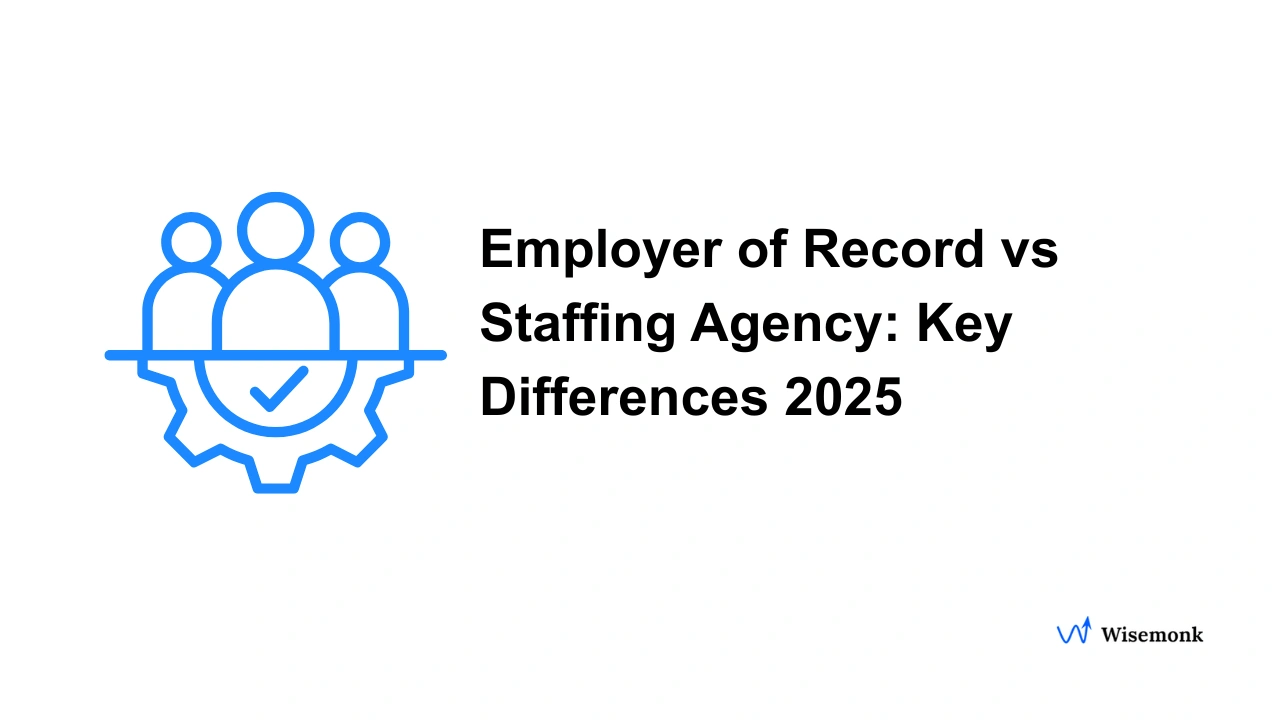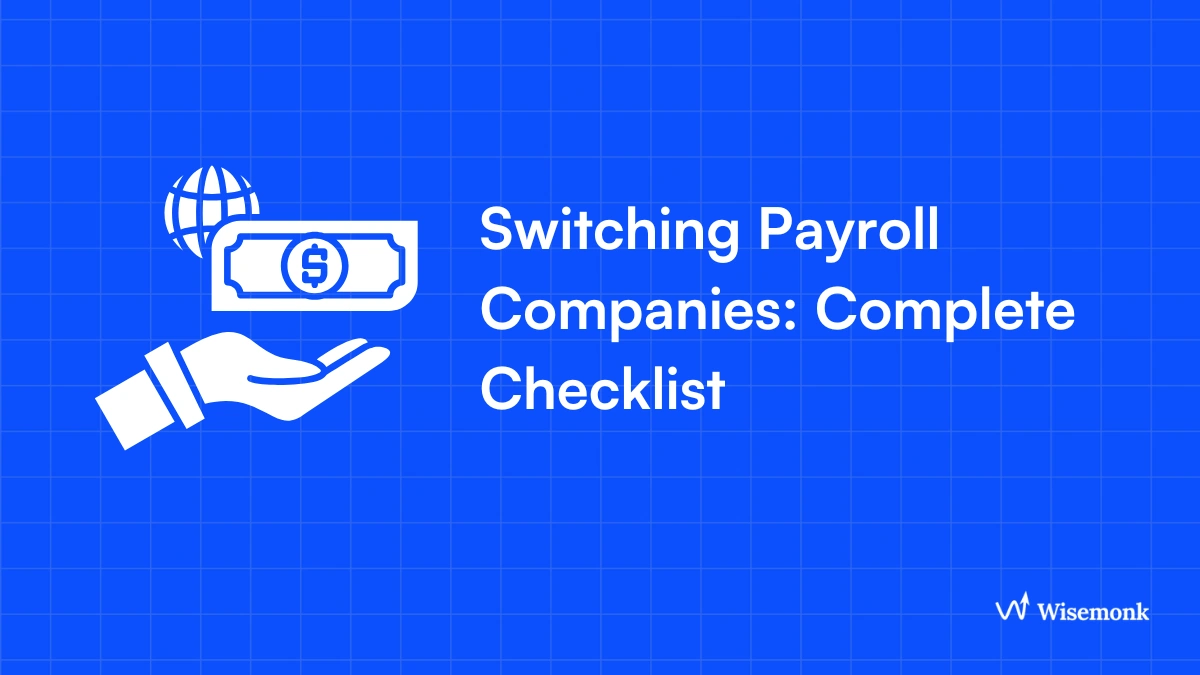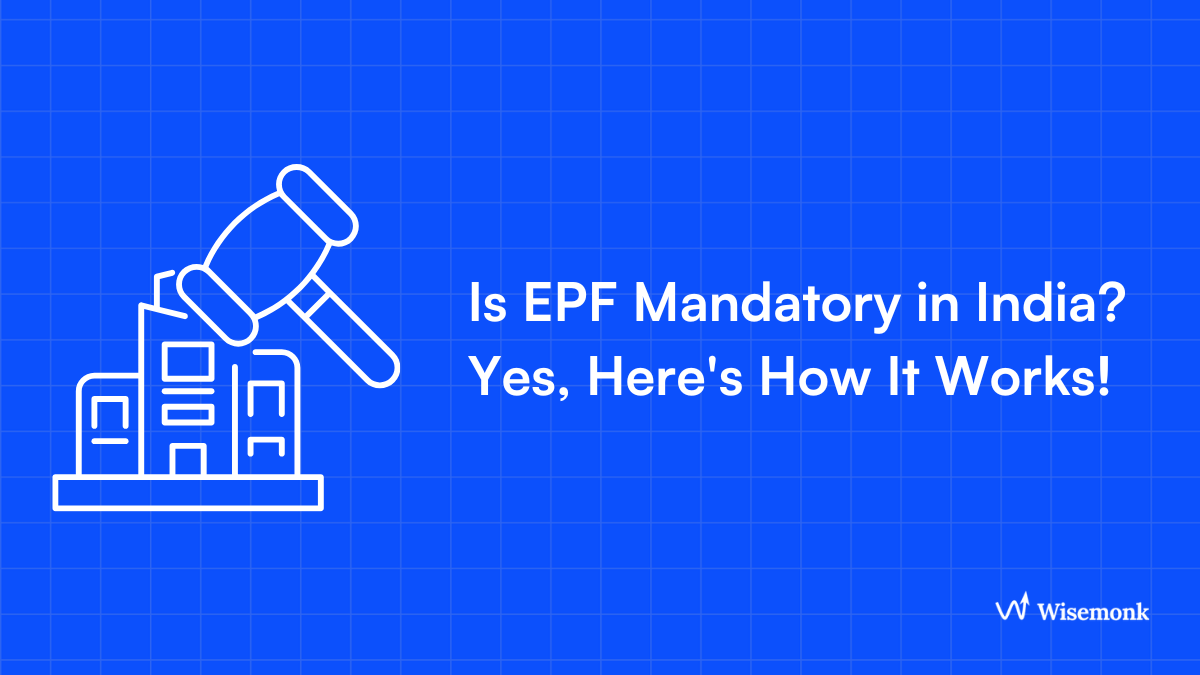- An Employer of Record (EOR) acts as the legal employer, handling compliance, payroll, and benefits for permanent roles, enabling global hiring without the need for local entities.
- A Staffing Agency connects employers with temporary or contract workers, manages recruitment and payroll, but shifts employment risks to the client.
- Choose EOR for permanent international hires, compliance management, and global expansion.
- Choose a Staffing Agency for temporary projects, seasonal needs, and quick talent gaps.
- When choosing a provider, prioritize a proven track record, compliance expertise, transparent pricing, and responsive support for seamless workforce management.
Need help with your global expansion? Contact us today!
Discover how Wisemonk creates impactful and reliable content.
Looking to expand your team globally and wondering whether to use an Employer of Record (EOR) or a staffing agency? If you're managing a global workforce or planning international expansion, understanding the key differences between these two options is essential. Both EOR services and staffing agencies help businesses manage complex local labor laws, but each option suits different needs.
In this guide, we’ll explore the differences between an Employer of Record and a staffing agency, and offer insights on when to choose each, so you can make an informed decision for your business in 2025.
What is an Employer of Record (EOR)?[toc=What is EOR]
An Employer of Record (EOR) is a service provider that legally hires employees on behalf of another company, handling all the formal employment responsibilities while the client manages the employees’ day-to-day work. For businesses expanding internationally, an EOR simplifies hiring in new regions by handling the complexities of local laws, payroll, and compliance without requiring you to establish a local entity.
Here’s what an EOR typically offers:
- Legal employment of domestic and international workers
- Locally compliant employment contracts
- Global payroll processing and tax filing
- Administration of employee benefits and perks
- Compliance with local labor and tax laws
- Onboarding and offboarding support
- Background checks and mandatory documentation
- Expense management and IT asset distribution
- Visa and immigration support
- Handling terminations and dispute resolution
- Workers’ compensation and insurance
Based on our extensive research and real-world cases, EOR services are a strategic solution for organizations aiming to scale globally while minimizing legal and administrative risks.
What is a Staffing Agency?[toc=What is Staffing Agency]
A staffing agency, also known as a recruitment or employment agency, connects businesses with job seekers, typically for temporary, contract, or sometimes permanent positions. In our experience working with both startups and large companies, staffing agencies are key for quickly filling talent gaps, especially for short-term or seasonal needs.
Here’s what a staffing agency typically offers:
- Sourcing and screening candidates
- Conducting initial interviews and skills assessments
- Providing temporary, contract, or temp-to-hire employees
- Managing payroll and timesheets for temporary staff
- Conducting background checks and reference verifications
- Replacing workers if placements don’t meet expectations
- Offering workforce planning and talent consulting
Staffing agencies are especially effective when businesses need fast, flexible staffing solutions to meet immediate demands.
What are the key differences between an Employer of Record (EOR) and a Staffing Agency?[toc=Key Differences]
When expanding your business, especially internationally, it's crucial to understand the distinctions between an Employer of Record (EOR) and a staffing agency. Each plays a unique role in workforce management, and choosing the right one can significantly impact your operations.
Here’s a clear, side-by-side comparison to help you see how each model works:
What are the pros and cons of an Employer of Record (EOR)?[toc=Pros & Cons of EOR]
From our extensive experience helping companies expand internationally, here are the quick pros and cons of using an Employer of Record (EOR):
For businesses looking to expand globally without the complexity of establishing a local entity, an EOR is a solid choice. It takes care of all the legal and HR headaches. It’s all about weighing the convenience versus the cost!
What are the pros and cons of a Staffing Agency?[toc=Pros & Cons of Staffing Agency]
From our extensive experience helping businesses expand quickly, we’ve seen that staffing agencies are crucial for filling talent gaps, especially for short-term or specialized needs.
Here are the quick pros and cons of using a Staffing Agency:
When should you choose an Employer of Record (EOR)?[toc=When to Choose EOR]
From our experience working with businesses of all sizes, we've found that an Employer of Record (EOR) is a game-changer for global hiring when speed, flexibility, and avoiding the hassle of setting up a local entity are top priorities. If you're aiming to expand globally while staying compliant and reducing administrative headaches, an EOR could be exactly what you need.
An EOR is a great choice if:
- You want to hire employees in a country where you don’t have a legal entity: EOR services make it possible to onboard talent anywhere in the world without the cost and complexity of setting up a local branch or subsidiary.
- You need to ensure compliance with local employment laws, payroll, and tax regulations: Employer of Record specialize in navigating complex, ever-changing legal requirements, reducing your legal risk of fines or legal issues.
- You’re expanding into new markets and want to test the waters: EOR companies allow you to explore new geographies with minimal commitment, making it easier to scale up or down as your business needs evolve.
- You want to focus internal resources on core business activities: By outsourcing HR, payroll, and compliance tasks, your team can stay focused on what matters most.
- You’re hiring remote or distributed teams across multiple countries: EOR services are designed to handle the complexities of global remote work, ensuring a consistent employee experience.
- You need to onboard employees quickly and efficiently: Employer of Record streamlines the hiring process, often enabling you to have new hires up and running in days rather than months.
- You want to reduce the risk of worker misclassification: EOR companies take on the legal employer role, helping you avoid costly misclassification penalties.
When should you choose a Staffing Agency?[toc=When to Choose Staffing Agency]
Staffing agencies are the perfect solution when you need quick, flexible staffing, especially for short-term or fluctuating needs. They’re great at bridging talent gaps quickly and efficiently.
A Staffing Agency is a great choice if:
- You need to fill temporary or contract positions fast: Whether it's a sudden project ramp-up or unexpected absences, staffing agencies provide pre-vetted candidates within days, minimizing downtime.
- Your business faces seasonal or cyclical demand: Retailers, manufacturers, and service providers often use staffing agencies to scale up or down during busy periods, avoiding long-term commitments.
- You want to save time on recruitment: Staffing agencies handle sourcing, screening, and interviews, freeing up your HR team to focus on other priorities.
- You need specialized skills for short-term projects: Agencies tap into niche talent pools, making it easier to find experts for specific roles or projects.
- You need flexibility without increasing permanent headcount: For businesses with strict headcount limits, staffing agencies provide the flexibility to bring in talent without adding to permanent payroll.
- You want to "try before you buy": Temp-to-perm arrangements let you assess a candidate's fit before making a long-term commitment.
- You have limited HR capacity for temporary staff: Staffing agencies typically manage payroll, compliance, and basic HR tasks for their placements, reducing your admin workload.
Based on our experience, staffing agencies are especially valuable for businesses dealing with fluctuating workloads, tight deadlines, or short-term expertise needs. They provide a flexible, efficient way to keep operations running smoothly without the overhead of permanent hires.
How to choose between EOR services & Staffing Agency: A Decision-Making Framework[toc=How to Choose]
The choice between an Employer of Record (EOR) and a staffing agency boils down to a few key considerations.
Here is a quick breakdown of the main factors, hiring needs, geographic scope, compliance, speed, flexibility, and budget, to help you make the right call.
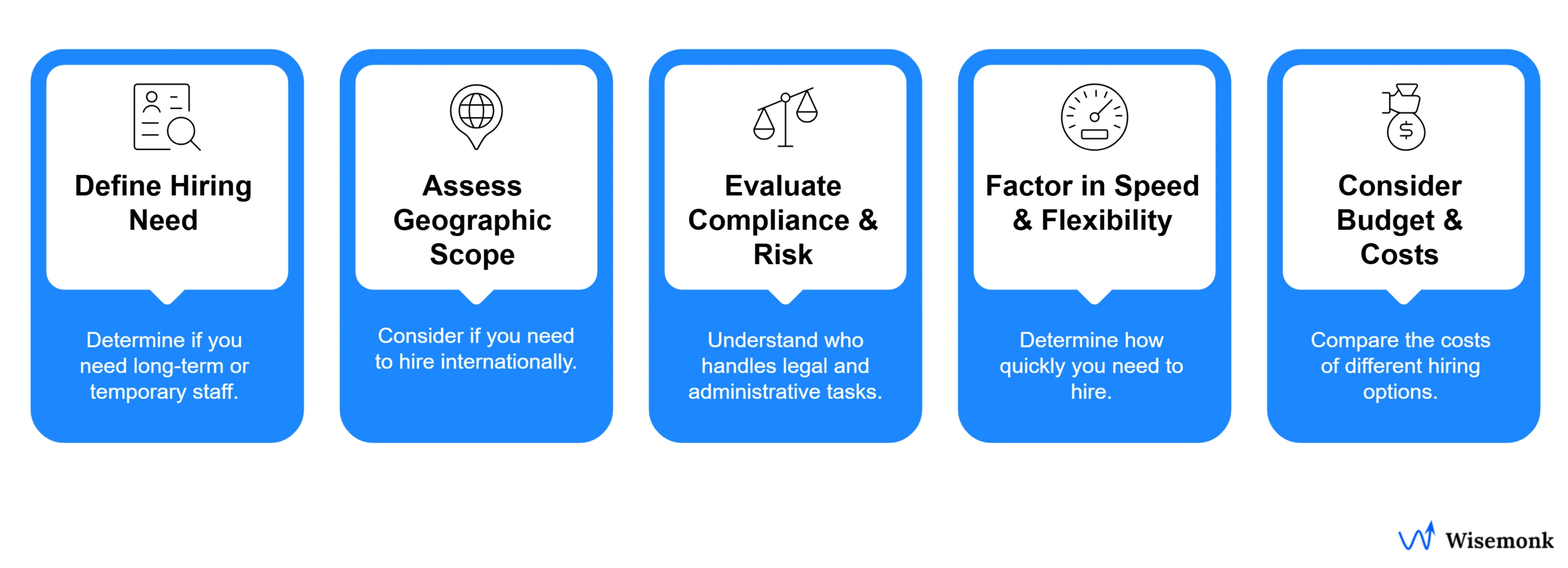
1. Define the Nature of Your Hiring Need
- EOR: Ideal for long-term, full-time employees, especially in international settings.
- Staffing Agency: Best suited for temporary, contract, or short-term roles.
2. Assess Your Geographic Scope
- EOR: Enables hiring in countries where you lack a legal entity, ensuring compliance with local labor laws.
- Staffing Agency: Typically operates within a single country or region; may not support international hiring.
3. Evaluate Compliance & Risk
- EOR: Takes on legal and administrative responsibilities, including payroll, taxes, and benefits, reducing your compliance risks.
- Staffing Agency: Assists with recruitment but doesn't assume full legal employer responsibilities.
4. Factor in Speed & Flexibility
- EOR: Streamlines onboarding and payroll processes, facilitating quicker employee integration.
- Staffing Agency: Offers rapid placement of candidates, ideal for urgent or short-term staffing needs.
5. Consider Budget & Costs
- EOR: May involve higher upfront costs due to comprehensive services but can be cost-effective for long-term international expansion.
- Staffing Agency: Charges placement fees or a percentage of the employee's salary; may be more economical for short-term hires.
Practical Example:
- Expanding your sales team in a new country for the long term?
An EOR is likely your best fit. - Need 20 extra hands for a three-month product launch?
A staffing agency is probably the way to go.
Choosing between an EOR and a staffing agency depends on your specific hiring needs, geographic expansion plans, compliance requirements, desired speed, flexibility, and budget constraints. By carefully considering these factors, you can select the solution that best aligns with your business objectives.
What should you look for before selecting an EOR or Staffing Agency?[toc=Considerations]
Choosing the right Employer of Record (EOR) or staffing agency is essential for your global hiring and workforce management.
From our extensive experience supporting businesses with their global hiring efforts, we've identified key factors that separate the best partners from the rest.
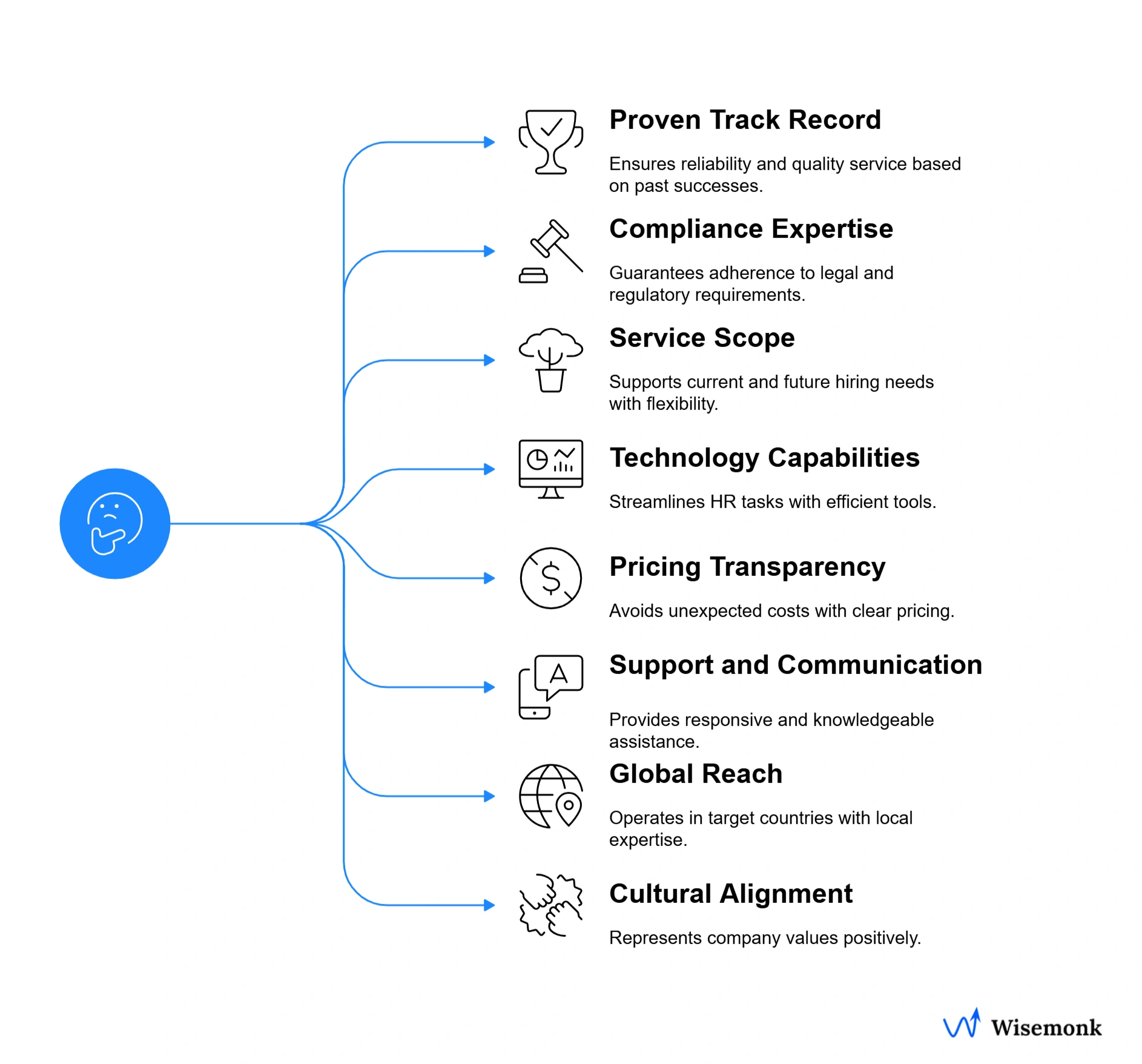
1. Proven Track Record and Reputation
- Look for EOR services or staffing agencies with a proven history of success in your industry and target global markets.
- Check client reviews, case studies, and testimonials to gauge their reliability and service quality. A strong reputation means a smoother experience when managing temporary employees, payroll, and HR tasks.
2. Compliance Expertise
- For Employer of Record: Ensure they’re knowledgeable about local labor laws, tax regulations, statutory benefits, and all other employment requirements in the countries you plan to hire.
- For Staffing Agencies: Confirm they understand employment laws for temporary workers, contract workers, and those in international employment laws. Compliance isn’t just a requirement, it’s a foundational element of successful, risk-free hiring.
3. Service Scope and Flexibility
- Assess whether the provider can support your current hiring needs and scale with your business’s growth trajectory.
- Ask if they can customize employment contracts, employee benefits, and onboarding processes to align with your company culture. Flexibility ensures that your business remains adaptable as you expand your global workforce.
4. Technology and Reporting Capabilities
- Evaluate the quality of their HR platforms, payroll processing, and workforce management tools.
- Look for transparent reporting, real-time dashboards, and self-service options for both employers and employees. The right technology ensures that your HR-related tasks run smoothly, from payroll compliance to tax forms and benefits enrollment.
5. Transparency in Pricing and Contracts
- Demand clear, upfront pricing with no hidden fees or surprise charges.
- Carefully review contract terms, focusing on notice periods, exit clauses, and service level agreements (SLAs). Transparent pricing means no unexpected costs later, allowing you to plan for both global expansion and payroll management without the hidden expenses.
6. Support and Communication
- Choose a provider with responsive, knowledgeable account managers and support teams who are accessible when you need them.
- Test their responsiveness during the sales process. This is often a good indicator of how they'll handle your staffing services and ongoing support once you’ve signed on.
7. Global Reach and Local Presence
- For EOR: Ensure they have the ability to operate in all the countries you plan to hire in, with local experts who understand regional labor laws and tax laws.
- For Staffing Agencies: Ensure they have access to deep talent pools and the local workforce in your target locations, especially for temporary hires or specialized roles.
8. Cultural Alignment
- The provider should understand your company’s values and be able to represent your brand positively to candidates and employees.
- Look for a partner who aligns with your company culture, as they will act as an extension of your team when it comes to recruiting and managing both permanent employees and contract workers.
Final Thoughts
From our experience, the right EOR or staffing agency is much more than just a service provider, it’s a true business partner. They help you manage payroll, stay compliant with local labor laws, reduce legal risks, and secure the best talent to fuel your business growth. By taking the time to vet your options thoroughly, you’ll ensure smoother global hiring, better employee experiences, and stronger business outcomes.
How Wisemonk can help you?[toc=How Wisemonk Helps]
Wisemonk is the go-to Employer of Record (EOR) solution for global businesses seeking a reliable partner to manage their international workforce. While we specialize in providing tailored EOR services for businesses expanding into India, we also support clients with their global needs.
Here’s how we help your business grow:
- Recruitment Services: We handle everything from resume screening to interviews, ensuring you hire top full-time employees or contractors quickly and efficiently.
- Payroll Management: We manage payroll processing, ensuring your team gets paid on time and payroll taxes are filed correctly, no matter where they’re located.
- Benefits Administration: We offer tailored employee benefits, from health insurance to retirement plans, keeping your workforce happy and compliant with local labor laws.
- Onboarding & Offboarding: We make onboarding seamless and handle employee terminations, ensuring smooth transitions for your team.
- Compliance & Legal Expertise: Navigating local labor laws, tax regulations, and legal requirements can be tricky, but we’ve got the expertise to manage it for you.
With Wisemonk, global expansion is easy, efficient, and fully compliant. Let us handle the complexities, so you can focus on growing your business.
Ready to make your global expansion effortless? Reach out to us today!
Frequently asked questions
What is the difference between Employer of Record and Staffing?
An Employer of Record (EOR) legally employs workers on behalf of another company, handling payroll, benefits, and compliance with local labor laws. A staffing agency, on the other hand, recruits and places temporary or contract workers but doesn’t take on the legal responsibilities of employment. Essentially, an EOR manages all legal aspects, while staffing agencies focus on recruitment.
What is the Employer of Record for Staffing Agencies?
For staffing agencies, the Employer of Record (EOR) is the legal entity responsible for the employment compliance, payroll taxes, and benefits administration of the staff they place with client companies. The staffing agency handles recruitment, but the EOR takes on the legal employer role, ensuring compliance with local labor laws.
Can a staffing agency help with international hiring?
While staffing agencies can provide talent locally or nationally, they usually don’t offer the services needed for international hiring. For global expansion, you’ll need an Employer of Record (EOR), which ensures compliance with international employment laws, handles payroll taxes, and manages benefits across different countries.
When to use an Employer of Record?
An EOR is ideal when expanding into new countries or hiring remote workers without establishing a local entity. It’s the best option when you need to ensure compliance with local labor laws and tax regulations while reducing administrative burden. If you’re looking to hire quickly and compliantly in unfamiliar markets, an EOR is your go-to solution.
Is a staffing agency an employer?
No, a staffing agency is not the legal employer of the workers it places. They act as recruiters who find and place temporary workers or contract employees with client companies. The staffing agency manages the recruitment process, but the actual legal employer of the worker is typically the client company or the Employer of Record (EOR).
What is the best Employer of Record?
The best Employer of Record depends on your specific needs, such as global reach, industry expertise, and compliance capabilities. Look for a provider with experience in your target markets, a strong track record of managing payroll and employee benefits, and clear, transparent pricing. Wisemonk is a strong choice for businesses looking to expand into India or manage global teams while staying compliant with local labor laws.
Read more: 10 Best Employer of Record (EOR) Companies in 2025 & Best EOR Services for Startups in 2025
Is a staffing agency the same as an employment agency?
Yes, a staffing agency and an employment agency are often used interchangeably. Both recruit and place workers, but staffing agencies usually focus on temporary or contract placements, while employment agencies may deal with both permanent and temporary staffing. The terms are largely synonymous but can vary based on the types of workers they specialize in.
